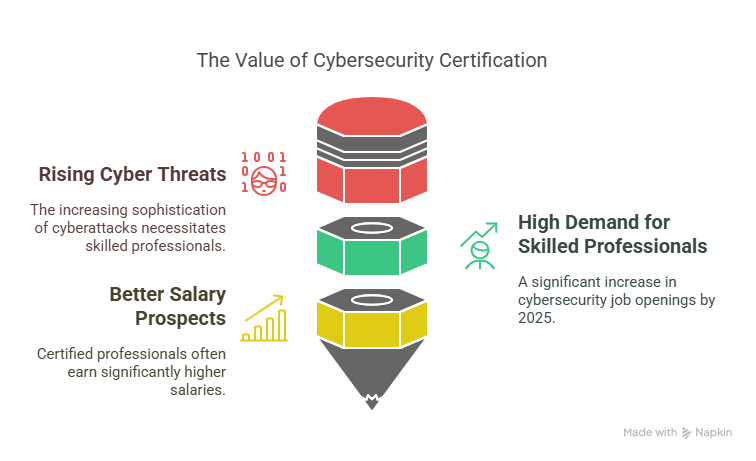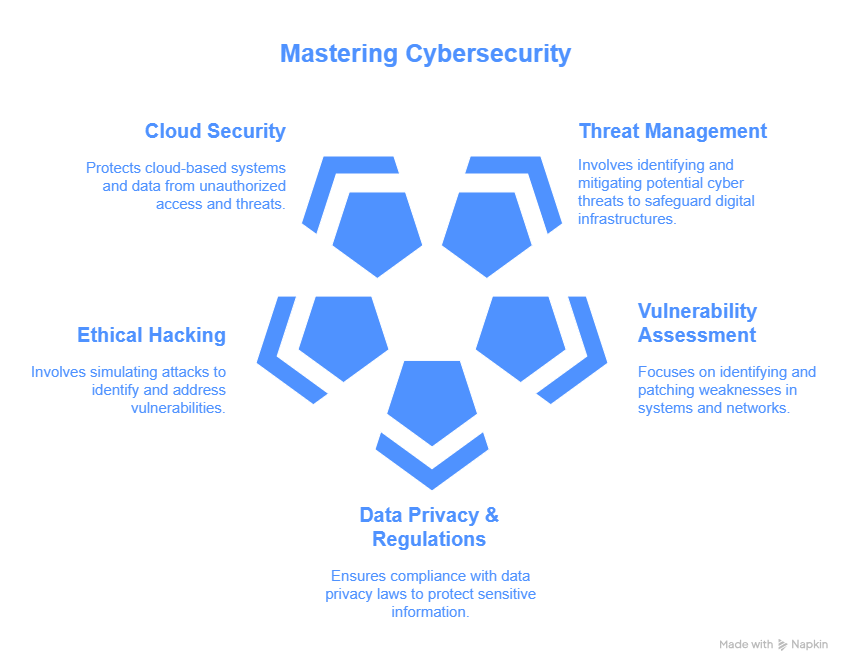Table of Contents
- Why Pursue a Cybersecurity Specialist Certification?
- 1. Rising Cyber Threats
- 2. High Demand for Skilled Professionals
- 3. Better Salary Prospects
- What Skills Does a Cybersecurity Specialist Certification Cover?
- Comprehensive Table of ACSMI Cybersecurity Specialist Certification
- Where to Get Certified?
- Steps to Becoming a Certified Cybersecurity Specialist
- Top Benefits of Being Certified
- Final Thoughts
- FAQs About Cybersecurity Specialist Certification
In 2025, the world of cybersecurity is evolving at an accelerated pace. As digital threats become more sophisticated, both individuals and organizations are tasked with ensuring that their data, infrastructure, and systems remain secure. The Cybersecurity Certification Test and Cybersecurity Specialist Certification are professional credentials designed to equip individuals with the skills necessary to defend against these growing threats, manage security operations, and stay in line with global cybersecurity standards. Whether you’re an IT professional looking to specialize in cybersecurity or someone from another field making the switch, obtaining this certification will provide you with the expertise required to succeed in the rapidly growing cybersecurity sector.
Why Pursue a Cybersecurity Specialist Certification?

1. Rising Cyber Threats
In the modern digital landscape, cybersecurity has become more critical than ever. With cyberattacks growing exponentially in sophistication, organizations are at constant risk of data breaches, ransomware attacks, and phishing schemes. These breaches can result in significant financial losses, legal consequences, and damage to reputation. Cybersecurity specialists are tasked with preventing these attacks, ensuring the safety of digital infrastructures, and protecting sensitive data. With new types of threats emerging frequently, a Cybersecurity Specialist Certification equips professionals with the tools, methodologies, and knowledge to stay ahead of cybercriminals.
In 2025, cyber threats continue to evolve, with advanced tactics such as AI-driven attacks and deepfake technologies becoming more prevalent. These challenges underline the importance of staying up-to-date with the latest security technologies and threat intelligence. Certification programs prepare professionals to handle these ever-changing challenges, making them a valuable asset to any organization.
2. High Demand for Skilled Professionals
As the digital landscape grows, so does the need for skilled cybersecurity professionals. According to recent studies, cybersecurity job openings are expected to increase by 35% by 2025, outpacing most other professions. This surge in demand for cybersecurity experts has made certifications a valuable asset. They signal to potential employers that an individual possesses the specific skills necessary to perform the job.
For professionals looking to enter the field or those already in IT, certifications act as a competitive differentiator. With businesses actively looking to fill roles such as Security Analysts, IT Security Specialists, and Threat Managers, having a Cybersecurity Specialist Certification on your resume can set you apart from other job candidates. Whether you’re a recent graduate or a seasoned professional aiming to shift into cybersecurity, certifications play a key role in ensuring you remain competitive in the job market.
3. Better Salary Prospects
Certified professionals in cybersecurity often enjoy a significant salary boost compared to their uncertified peers. According to recent reports, individuals with a Cybersecurity Specialist Certification can earn up to 30% more than their counterparts who do not hold a certification. Employers understand the value of certified employees and are willing to offer higher compensation to those who have demonstrated their proficiency and commitment to cybersecurity.
The financial reward of becoming certified is evident in many high-demand roles. For example, positions such as Certified Information Systems Security Professional (CISSP), Certified Ethical Hacker (CEH), and Cloud Security Specialist offer salaries in the six-figure range, depending on experience and expertise. This makes obtaining a certification not only an investment in skill development but also in long-term earning potential.
What Skills Does a Cybersecurity Specialist Certification Cover?
A Cybersecurity Specialist Certification focuses on building skills that are critical to managing and protecting digital infrastructures. Here are the key areas covered:

1. Threat Management
Threat management involves identifying potential risks, responding to active security incidents, and mitigating future threats. As a cybersecurity specialist, it’s vital to understand the types of cyberattacks that could target an organization and how to defend against them. Threat management includes proactive strategies such as threat intelligence gathering, vulnerability scanning, and implementing security policies to reduce risks.
The certification teaches how to use tools like SIEM (Security Information and Event Management) systems to monitor networks in real-time for suspicious activity, allowing professionals to respond swiftly to minimize damage. With the increasing sophistication of threats like ransomware and advanced persistent threats (APTs), professionals trained in threat management can make organizations safer and more resilient to attacks.
2. Vulnerability Assessment
Vulnerability assessment is another critical aspect of cybersecurity. It involves identifying, evaluating, and patching weaknesses within an organization’s systems, applications, and network infrastructure. Certified cybersecurity specialists are trained to use tools such as vulnerability scanners and penetration testing techniques to pinpoint security holes that cybercriminals could exploit.
The certification program includes hands-on training with industry-standard tools like Nessus, Nexpose, and Burp Suite to assess security flaws. This helps build a deep understanding of system vulnerabilities and equips professionals with the knowledge to prevent exploits before they become problems. As organizations expand their digital operations and embrace cloud-based environments, vulnerability assessment skills become even more valuable.
3. Data Privacy & Regulations
With privacy concerns at an all-time high, cybersecurity specialists must understand and comply with data privacy laws such as GDPR (General Data Protection Regulation), HIPAA (Health Insurance Portability and Accountability Act), and CCPA (California Consumer Privacy Act). These laws set guidelines for how businesses must handle customer data, especially sensitive information. Failing to comply with these regulations can result in hefty fines and reputational damage.
A Cybersecurity Specialist Certification includes modules that cover how to align an organization’s data handling practices with these regulations. By understanding the legal frameworks around data privacy, cybersecurity professionals can help businesses navigate complex compliance landscapes, ensuring they avoid legal issues while keeping customer data secure.
4. Ethical Hacking
Ethical hacking, or penetration testing, involves simulating cyberattacks to identify and address vulnerabilities before malicious hackers can exploit them. In a Cybersecurity Specialist Certification, professionals learn how to ethically hack into systems using various tools and techniques. This includes vulnerability scanning, social engineering tactics, and exploiting weaknesses in network configurations or web applications.
Ethical hacking skills are critical because they provide hands-on experience in real-world scenarios, equipping specialists to respond effectively to actual attacks. As more organizations move towards adopting proactive defense strategies, ethical hacking has become a core competency that cybersecurity specialists must possess.
5. Cloud Security
As more businesses migrate to cloud platforms like AWS, Microsoft Azure, and Google Cloud, protecting data in the cloud has become a significant challenge. Cloud security involves securing cloud-based systems, applications, and data storage from unauthorized access and potential cyberattacks. A Cybersecurity Specialist Certification includes training on securing cloud infrastructures, setting up firewalls, encrypting data, and managing cloud access control to ensure that only authorized personnel can access sensitive cloud-based information.
Professionals gain practical knowledge about cloud security services, learn how to design secure cloud architectures, and implement best practices for cloud data protection. With the rapid adoption of cloud technology, cloud security skills have become highly sought after in the cybersecurity job market.
Comprehensive Table of ACSMI Cybersecurity Specialist Certification
ACSMI’s It Specialist Cybersecurity Certification stands out because it offers over 400 modules, covering comprehensive cybersecurity topics across various domains. Whether you’re a beginner looking to enter the field or an experienced professional aiming to specialize, ACSMI offers tailored learning pathways, including real-world simulations, hands-on labs, and live mentorship sessions. Their program is globally recognized, flexible, and structured to provide professionals with the skills they need to tackle today’s complex cyber challenges.
Where to Get Certified?
Choosing the right certification provider is critical to advancing your career. The Advanced Cybersecurity Management Institute (ACSMI) is a top provider offering a comprehensive program with over 400 specialized modules, covering topics such as ethical hacking, cloud security, compliance, and advanced threat management. ACSMI’s program is highly flexible, allowing you to tailor your learning experience to your career goals. With global recognition and practical hands-on training, ACSMI is an ideal choice for cybersecurity professionals at any level.
Other respected certification providers include:
-
ISC² (CISSP): Ideal for professionals in security management and architecture.
-
CompTIA (Security+): A great starting point for those new to cybersecurity.
-
EC-Council (CEH): Focused on ethical hacking and penetration testing.
-
ISACA (CISM): For those focused on security management and strategy.
Steps to Becoming a Certified Cybersecurity Specialist
-
Research Programs – Begin by researching different programs to find one that aligns with your goals. ACSMI’s program offers tracks for both beginners and seasoned professionals.
-
Meet Eligibility Requirements – Ensure you meet the eligibility criteria before starting the certification program.
-
Master the Curriculum – Dedicate time to study and complete hands-on labs, which are crucial for building practical cybersecurity skills.
-
Complete the Exam – Once you’ve mastered the material, take the certification exam to prove your knowledge.
-
Expand Your Experience – Gaining practical, real-world experience will further solidify your expertise and improve your job prospects.
Top Benefits of Being Certified
-
Enhanced Job Readiness – Certifications provide employers with confidence in your skills, making you more likely to be hired.
-
Industry Recognition – Certification demonstrates a commitment to staying updated with the latest cybersecurity standards.
-
Networking Opportunities – Many certification programs host global conferences, offering valuable networking opportunities.
-
Career Advancement – Certified professionals often experience smoother transitions into leadership roles within organizations.
Final Thoughts
Obtaining a Cybersecurity Specialist Certification is a strategic investment in your career. As the demand for cybersecurity professionals continues to rise in 2025, becoming certified will not only make you more marketable but also give you the skills needed to protect critical digital infrastructures. Whether you’re starting out or looking to specialize, this certification provides the foundation and advanced knowledge needed to excel. ACSMI’s certification program offers the most comprehensive, globally recognized curriculum, making it the perfect choice for aspiring cybersecurity professionals.
FAQs About Cybersecurity Specialist Certification
1. What are the eligibility criteria for a cybersecurity specialist certification?
Eligibility varies by provider. However, most programs require a basic understanding of IT, networking, and security concepts. Some certifications, such as ACSMI’s, are beginner-friendly and require no prior experience, making them an excellent choice for individuals looking to switch careers. Advanced certifications, like CISSP, may require a certain level of work experience in cybersecurity.
2. How long does it take to complete the certification?
The duration of the certification program depends on the provider and the learner’s pace. ACSMI’s certification, for example, allows flexibility, and candidates can typically complete the certification in 4-6 months with consistent study. Self-paced learning options make it easier for professionals to balance certifications with their work schedules.
3. Are cybersecurity certifications worth it?
Yes, cybersecurity certifications are highly valued by employers and provide a competitive edge in the job market. They signal proficiency and expertise, making certified professionals more desirable to organizations. Certification also opens the door to higher-paying roles and career advancement.
4. How often do certifications need to be updated?
Most cybersecurity certifications require renewal every 3-5 years. This ensures that professionals remain up-to-date with the latest industry standards, technologies, and emerging cyber threats. Ongoing education and certification renewal are essential for maintaining a competitive edge in the cybersecurity field.
5. Can someone from a non-IT background pursue this certification?
Yes! Many cybersecurity programs, including ACSMI’s, offer beginner-friendly courses designed specifically for individuals transitioning from other fields. As cybersecurity is an ever-evolving industry, there is always room for new talent, especially those with strong problem-solving skills and a keen interest in technology.

Leave a Reply